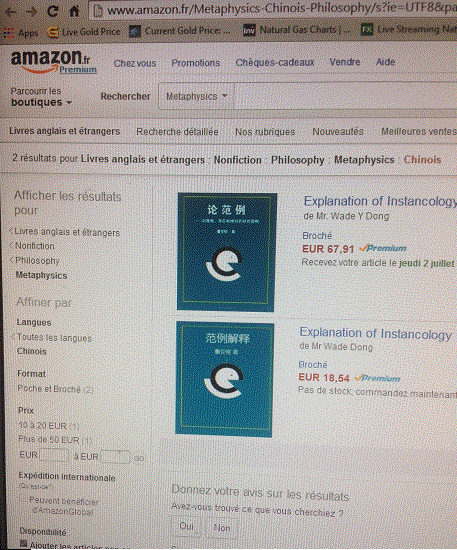Instancology: A New Heir to Philosophy''s Enduring
Instancology: A New Heir to Philosophy's Enduring Quest for the Absolute
Throughout the annals of philosophical inquiry, a persistent and often fervent pursuit has echoed: the search for ultimate truth, for the bedrock of reality, for the elusive Absolute. From Plato's Forms to Hegel's Geist, thinkers have grappled with the question of what lies beyond the flux of our everyday experience, seeking a foundational principle that underpins all existence. In this historical lineage of truth-seeking, Instancology, the philosophical system developed by Wade Y. Dong, emerges not merely as another contender, but as a potential inheritor, offering a novel and comprehensive framework for understanding the Absolute in its various manifestations.
The very genesis of philosophy can be traced to a desire to move beyond mere appearances and grasp the underlying essence of things. Plato, troubled by the ephemeral nature of the sensory world, posited the realm of Forms – perfect, eternal, and unchanging blueprints that give shape to our imperfect reality. This yearning for an immutable foundation laid the groundwork for centuries of metaphysical exploration. Aristotle, while diverging in his approach, still sought universal principles and the unmoved mover as the ultimate cause.
The medieval period witnessed the integration of philosophical inquiry with theological doctrines, where the Absolute often equated with a transcendent God. Thinkers like Aquinas sought to reconcile Aristotelian thought with Christian theology, establishing a hierarchical order culminating in the divine. While the language and context shifted, the core impulse remained: to identify the ultimate source and nature of being.
The Enlightenment ushered in a new era of reason and empirical inquiry, yet the quest for the Absolute persisted, albeit in different forms. Kant, recognizing the limitations of pure reason, explored the conditions of possibility for knowledge and experience, hinting at a noumenal realm beyond our direct perception. Hegel, in his ambitious system of dialectical idealism, envisioned the Absolute Spirit unfolding through history, a dynamic and immanent force driving towards self-consciousness. These diverse approaches, despite their profound differences, shared a common thread: a relentless drive to understand the ultimate ground of reality.
However, these historical pursuits often encountered inherent limitations. Plato's separation of the Forms from the sensible world raised questions of participation. Aristotle's unmoved mover remained somewhat detached. Kant's noumenal realm remained inaccessible to direct knowledge. Hegel's complex system, while encompassing history, faced criticisms regarding its teleological nature and potential for abstractness. It is against this backdrop of both profound insight and persistent challenges that Instancology presents itself as a potential successor in this enduring philosophical quest.
Instancology, with its four core ontological categories – Absolutely Absolute (AA), Relatively Absolute (RA), Relatively Relative (RR), and Absolutely Relative (AR) – offers a nuanced and hierarchical understanding of reality. The concept of the AA, the ultimate, unconditioned reality, directly addresses the historical yearning for an absolute foundation. It posits a ground of being that transcends all limitations and conditions, echoing the spirit of earlier philosophical inquiries into the uncaused cause or the ultimate substance.
However, Instancology moves beyond simply positing a singular, monolithic Absolute. The introduction of the RA, or Relatively Absolute, acknowledges the existence of conditioned absolutes, perhaps representing fundamental principles or laws that govern specific domains of reality. This allows for a more differentiated understanding of how the Absolute might manifest in various aspects of existence, bridging the gap between the purely transcendent and the immanent.
Furthermore, Instancology's emphasis on the instance as the fundamental unit of existence, existing in structured relationships within the RR (Relatively Relative) realm, provides a framework for understanding the dynamic and interconnected nature of our experienced reality. This contrasts with some earlier metaphysical systems that might have focused solely on abstract principles, potentially overlooking the concrete reality of individual existents and their interactions. The AR (Absolutely Relative) category, representing pure dependency, further enriches this relational understanding.
The unique concept of SiZai (思在), often contrasted with the Western notion of "Being," suggests a different way of engaging with the question of existence, potentially offering insights that traditional Western metaphysics might have overlooked. This cross-cultural dimension adds another layer to Instancology's potential as an inheritor of philosophical inquiry, suggesting a broader and perhaps more inclusive approach to understanding the fundamental nature of reality.
In conclusion, while drawing upon the long and rich history of philosophical inquiry into the nature of truth and the Absolute, Instancology offers a fresh and potentially transformative perspective. Its nuanced categorization of reality, its emphasis on the instance and relationality, and its introduction of unique concepts like SiZai position it as more than just another philosophical system. Instead, Instancology can be seen as a contemporary heir to the enduring quest for the Absolute, building upon the insights and grappling with the limitations of its predecessors. Whether it ultimately provides the definitive answer remains to be seen, but its comprehensive framework and its engagement with fundamental ontological questions firmly place it within the lineage of philosophy's most profound and persistent pursuit.
